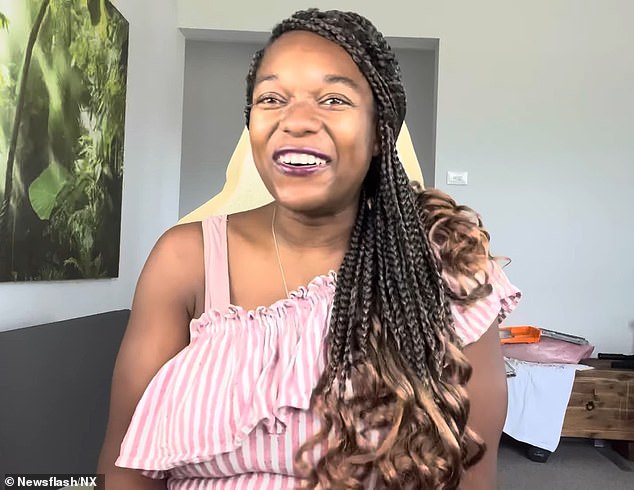An Australian home birth ‘guru’ has been charged with manslaughter over the death of a baby she helped deliver at a home birth.
Oyebola Coxon, a privately practising midwife who also advocates ‘natural’, at home births to her 40,000 social media followers, had attended a home in Wallsend, New South Wales, to assist a woman last October.
But the 36-year-old allegedly ignored signs of complications during the birth and the mother’s pleas to attend hospital, instead leaving her in labour for two days.
After the woman was then taken John Hunter Hospital in Newcastle, the baby boy was delivered by emergency cesarean.
However, police said the mother and newborn both suffered significant medical complications and the baby died eight days after the attempted home birth.
The Italian-born influencer midwife, has long posted on Instagram under the profile Mamma Informata to promote ‘positive births’ and has warned women to resist doctors’ advice.
In other videos she has encouraged women to give birth at home—even in high-risk cases—and alleged that gestational diabetes does not exist and blood tests and ultrasounds are unnecessary.
Ms Coxon has also sold paid online courses targeted at expectant mothers ‘on preparing for childbirth and breastfeeding’.

Oyebola Coxon, a privately practising midwife who also advocates ‘natural’, at home births to her 40,000 social media followers, had attended a home in Wallsend, New South Wales , to assist a woman last October

But the 36-year-old allegedly ignored signs of complications during the birth and the mother’s pleas to attend hospital, instead leaving her in labour for two days
But following a police investigation into the death of the newborn, Ms Coxon was arrrested and taken into custody in Wallsend, New South Wales, on August 14.
She was charged with manslaughter and grievous bodily harm, New South Wales Police Force said.
The midwife was granted bail after appearing in court.
Her bail conditions include that she must not act, practise or educate any person relating to any birth or pregnancy.
The trial is due to begin at Newcastle Crown Court on October 15.
Her arrest has also triggered outrage online over the lack of safeguards in publishing potentially dangerous health advice and misinformation on social media.
Around one in 50 women in England and Wales give birth at home, according to the NHS.
In the US, almost 50,000 births took place outside of hospital in 2023, according to an analysis published in the Journal of Perinatal Medicine.

following a police investigation into the death of the newborn, Ms Coxon was arrrested and taken into custody in Wallsend, New South Wales, on August 14. She was charged with manslaughter and grievous bodily harm, New South Wales Police Force said
Home births are controversial due to the lack of specialised care at hand if something goes seriously wrong.
Research suggests women who set out to give birth at home but end up going to hospital are less at risk of ‘obstetric interventions’, such as forceps.
However, this ‘may come at the expense of neonatal wellbeing’.
Last year, the Royal College of Obstetricians and Gynaecologists (RCOG) also said: ‘Home births, supported by a midwife, may be suitable for healthy, low-risk women who are having a second or subsequent child and have had a straightforward pregnancy.
‘However, for women having their first baby, evidence shows a home birth slightly increases the risk of a poor outcome for the baby.
‘Some degree of anxiety about giving birth is common in many expectant mothers.
‘Women should be given the opportunity to address their fears and past traumas via open discussions with their midwife or obstetrician.’
But in 2019, one Canadian study concluded home births may be as safe as delivering a baby in hospital for low-risk pregnancies.
Scientists from McMaster University analysed data from around a million births from 14 studies to compare the dangers of different birth locations.
They found that among women in countries with ‘well integrated health services’, the risk of their baby dying as a newborn or within four weeks was eight per cent higher than if they had been born in hospital.
Although the odds are greater, the researchers claimed they are neither statistically nor clinically significant.
Countries that were considered to have ‘well integrated healthcare’ were England, the US, the Netherlands, Iceland, Canada and New Zealand.
However, the risk of infant mortality skyrocketed to more than three times in nations with ‘less integrated settings’.
The researchers defined these as Norway, Sweden, Japan and Australia.
This article was originally published by a www.dailymail.co.uk . Read the Original article here. .

